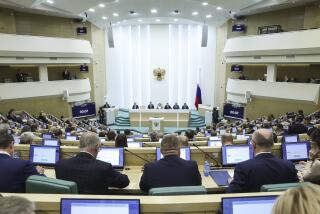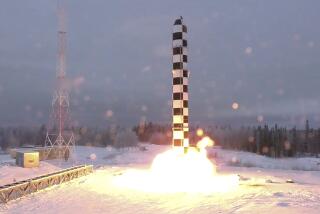Reagan’s Rejection of Nuclear Test Moratorium
- Share via
On the surface Soviet leader Mikhail Gorbachev’s latest proposal for a moratorium on nuclear testing resembles the propaganda ploy the Reagan Administration insists it really is. Beyond that the Soviet leader’s Easter message portends something more ominous. The announcement signals a breakdown in understanding.
The Soviet Union may well be expressing a newly gained determination to go its own way, telling us in essence that the protocol established at the last summit has all but disappeared. Words like “puzzled” and “surprised” keynote the article (March 30), “U.S. Rejects Soviet Talks.” The text of the address makes it clear. Gorbachev does not refute the possibility of another summit. He simply failed to acknowledge plans for such a meeting exist.
The Reagan Administration’s rather smug position, “We agree to disagree,” is falling apart. President Reagan echoed the familiar phrase once more. “It’s up to the Russians.” He may come to be like the man who woke up one morning to read his own obituary. But is the loss of diplomatic protocol so important? We co-existed without regular summit meetings for nearly five years while both countries exchanged insults across the ocean. Yet behind the bluster was the idea that tough talk then would mean serious bargaining later. Now we have to ask ourselves, has the time to bargain come and passed? There often arises a time in the heat of an argument when the individuals come to a standstill. Then, as often as not, one party chooses a single issue, and puts that above all others. Sometimes the issue has more symbolic than actual value. The moratorium seems like such an issue.
Complying with the existing agreement would be a simple gesture of good faith. But since both sides are preoccupied with “chipping away” at the other one, neither feels easy making even the smallest concession. With this bedrock failure the drying up of diplomatic avenues between the United States and the Soviet Union began.
We led the way with the expulsion of Soviet diplomats, the naval incursion into the Black Sea prior to the Libyan strike, and our intention to supply our most modern weapons to the guerrillas in Afghanistan and Angola. All indicate our preference for military solutions over the diplomatic process. This is of course a dangerous precedent.
The fact we took this protocol relationship for granted is evidenced in the remarks made by White House staff. It is impossible to ascertain Gorbachev’s ability or intention to honor an arms agreement with the United States. It is equally obvious our government is willing to offer nothing to the Soviet Union beyond empty protocol.
Each day we move closer to the old Soviet strategy, “We will bury you!” Our policy is based on two self-opposing fears. One is that if the Soviets do improve their economy, their technology, and their standard of living, they will also improve militarily, perhaps surpassing our own achievements. The other is the fear that the Soviets are a Third World power with a superpower arsenal. This is our current fear, that the brutal, unsophisticated and irrational Russian will push the button. The solution to the second is the first, but we hold neither choice acceptable.
It is not reaching too far to say that if the Soviets do go their own way they may soon begin preparing for war. In the absence of diplomacy and under extreme economic pressures promoted by a runaway arms race they may begin looking for a way out.
In that regard diplomacy is more like a stethoscope than a cure. It pays to know when trouble is coming. Unfortunately, the Reagan Administration is not listening. The President delegates his decision-making power to advisers, who among other things are not elected officials. They are not responsible too, nor do they represent the will of the American people. It is time we sent a message to the President. It is time to reform the power structure in the highest office of our government. It is time we used our resolve to promote peace, and abandoned our self-righteous claim to make war.
DAVID C. REUTTER
Vista
More to Read
Sign up for Essential California
The most important California stories and recommendations in your inbox every morning.
You may occasionally receive promotional content from the Los Angeles Times.










